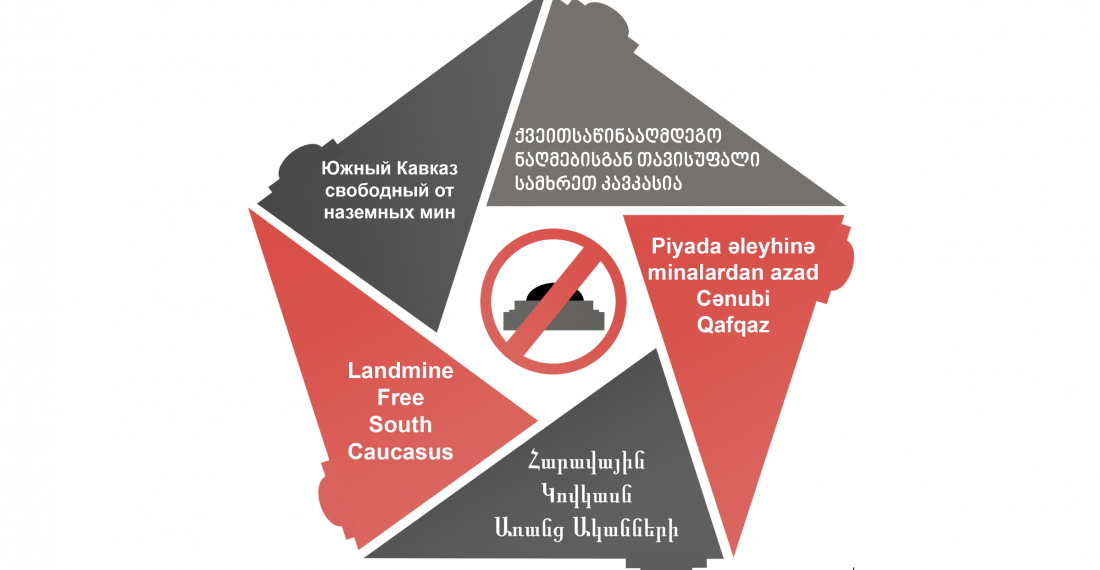Working for a landmine Free South Caucasus by 2030
The South Caucasus remains one of the areas most infected with contamination by landmines and other unexploded remnants of war in the world.
Decades of indiscriminate use of landmines by Soviet forces to protect their bases and facilities, as well as borders, and the military residue left by those Soviet forces when they left the region in the early 1990s, pileup on astonishingly large and widespread use of landmines by combatants in the many conflicts that have riddled the South Caucasus in the last thirty-five years.
Apart from the thousands of casualties caused directly or indirectly by landmines and other unexploded ordnance over the last three and a half decades, including several hundred in the last year, this contamination negatively impacts whole communities across the region, affecting their economic well-being, and exposing them to the constant threat of risk and danger. The residents of this landmine-plagued region are often tragically overlooked by the international community and forgotten by local authorities. Their suffering, and the dire consequences entire communities face from the threat of landmines, are often met with widespread indifference. Victims, their families, and their communities are in desperate need of recognition and assistance.
Last year, the Regional Campaign “Landmine Free South Caucasus”, declared 30th November as a Day of Solidarity with the victims of landmines and other unexploded remnants of war in the South Caucasus. The day is not just a memorial, but a call to humanitarian action. Thousands of people have been killed or injured across the region over the last three decades. The impact of the tragedies on families and communities is high, and the mechanism to alleviate the suffering, very weak. This is not yesterday’s problem. Last year once again saw hundreds killed or injured. The impact on communities is huge and affects tens of thousands of innocent people. In 2022/2023 the campaign focused its work to awareness of the impact of landmines and other remnants of war on individuals and communities across the region.
Overall, the Regional Campaign Landmine Free South Caucasus objective is to mobilise support for a landmine free South Caucasus by 2030. However, there are serious challenges ahead for achieving this objective, and they are political as much as technical.
Some satisfaction can be taken in the work done to eradicate the problem in the last decade.
In Georgia, a lot of work has been done and most contaminated areas have been cleared, although problems remain in some specific areas, and especially in the separatist territories outside of Tbilisi’s jurisdiction.
In Azerbaijan, particularly after the changed situation on the ground following the 2020 Karabakh War, the authorities face an acute situation. Hundreds of thousands of landmines hinder the process of returning displaced persons to their place of origin as is their right under international humanitarian law. In Armenia, the problem is somewhere in between, with the problem being mainly in border areas. No country in the South Caucasus can say that it has solved the problem completely.
As we mark the Day of solidarity with the victims of landmines and other remnants of war in the South Caucasus, we call for resolute action to eradicate the problem of landmines and other unexploded remnants of war from the South Caucasus once and for all. This will require the political will of the three governments, and the support of the international community.
The Regional Campaign “Landmine Free South Caucasus” is advocating for a regional approach towards the solution of this problem. With the prospect of a peace agreement between Armenia and Azerbaijan, and with South Caucasus regional co-operation all of a sudden becoming the flavour of the month, it is now possible to think of such a regional approach. This is also necessary. Landmine issues need to be taken out of the political domain and be approached mainly as a humanitarian issue. This will enable governments to co-operate on what was until recently a highly sensitive issue. A regional approach will make it easier to mobilise international resources for the effort. Huge resources are needed, and none of the three countries is in a position to do this alone. Eventually, a regional approach should also lead to the three countries together adopting the provisions of the Ottawa Convention. Adopted in 1997, the international agreement prohibits the use, stockpiling, production, and transfer of these landmines. It also mandates the destruction of stockpiles, the clearance of mined areas, and assistance to victims of landmines.
This is the way for the future, and work must start immediately.
This “Day of Solidarity” is more than a day of remembrance; it's a day of awareness-raising and action. It provides all stakeholders the opportunity to reaffirm the commitment to achieve a landmine free South Caucasus by 2030, despite the daunting challenges.







